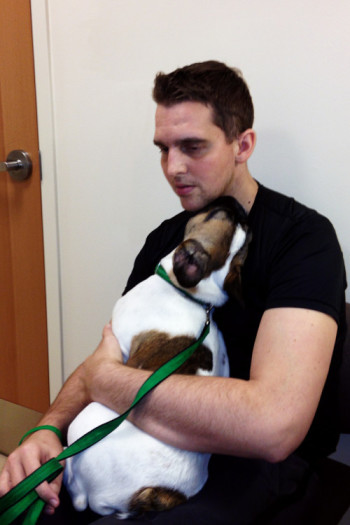A note from the author, Doreen Darsh: I will be attending Rare Disease Week (Feb 29 – Mar 3 ’16) in Washington, DC, representing TargetCancer Foundation of Boston. I was asked to submit a 500-word story about my experience with a rare disease. Here is what I was asked to include in my story.
In the middle of a summer afternoon, my 28 year-old son, Joe Garassino, called me at the office. “Mom, I have a really bad stomachache,” he said as I looked out my window into one those deep blue skies.
Six days later, on June 7, 2012— after an ultrasound and blood work followed by an endoscopy, a colonoscopy, an MRI and a liver biopsy— Joe, bon vivant and budding entrepreneur was diagnosed with a rare disease — intrahepatic cholangiocarcinoma, or cancer of the bile duct. That year about 3,000 U.S. citizens were similarly diagnosed, and their average age was seventy. Joe had no prior symptoms and no family history of the disease, but he had a tumor the size of a grapefruit in the left lobe of his liver. We never saw it coming.
Shortly afterwards, a PET scan confirmed that his cancer had metastasized to stage IV, and it seemed to advance overnight. I quit my job to become his full-time caregiver. Over the next seven months, Joe’s cancer spread to his bones, causing them to crack and fracture and inflict horrific pain. My days were jam-packed caring for Joe and trying to get him enough pain medication. There were countless appointments with oncologists and pain and palliative care specialists and the numerous visits to the Swim Center of St. Vincent’s in Bridgeport for radiation therapy, plus all the trips to Manhattan to Memorial Sloan Kettering for chemotherapy, and the multiple hospital admissions. Even though we knew it wouldn’t stop the cancer, Joe underwent surgery to protect his spine from the advancing disease. We spent down time with friends and family, and we also acquired a French bulldog puppy whom Joe named Mia. What better time to fall in love than when you are about to die?
In 2012, there were no treatments for cholangiocarcinoma and no available clinical trials for unresectable liver tumors and stage IV cancer. Joe’s doctors offered him chemo treatment based on what helped pancreatic cancer. The treatments did nothing to stop the advance of the aggressive disease. And 228 days after his diagnosis, on January 20, 2013, Joe died in our home.
As he faced this illness with no hope for a cure or even treatment that might extend his life, I watched a remarkable young man face death rather than the life dreamed of. And while he was not much of a writer, I found a few entries in his business journals, “The feeling of having to shelve dreams and goals…It’s tough, but I can do this…Staying strong…What is life worth when everything else is gone?” And, “Live everyday like it’s the last…SMILE.”
Several things helped my family cope with this rare disease: the rapid diagnosis of the competent and compassionate team at St. Vincent’s meant we did not waste precious time trying to figure out what was wrong, and enabled us to consult with doctors at some of the best cancer facilities. The other thing that helped us cope with his rare disease was love. Joe was loved by his friends and family, and we knew he loved each one of us.
Of course, I wish there had been treatments available for my son. What mother wouldn’t? We need more funding for NIH and more incentives for the development of drugs and access to affordable treatment for rare diseases and cancers.
Doreen Darsh is the mother of Lisbeth and Joe Garassino. She lives in Middlebury, CT with her son’s French bulldog, Mia and taking long walks to nearby Lake Elise is one of their favorite things to do.

